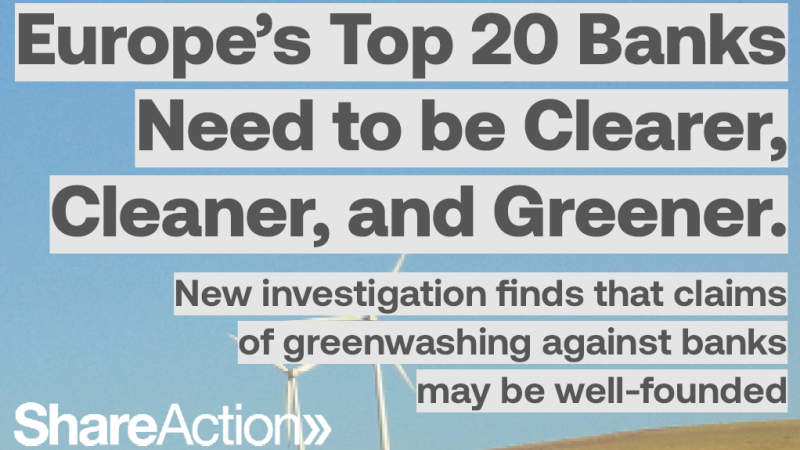Europe’s top 20 banks need to be clearer, cleaner and greener

A major investigation released today into Europe’s largest 20 banks has found that while banks are actively promoting their green finance credentials, there is a widespread lack of transparency around their green finance activity. This lack of clarity leaves all 20 banks open to the allegation of greenwashing.
The research undertaken by ShareAction’s banks team found that though all the banks investigated have set a target or report in some form on their green finance activity, just four banks – Barclays, BNP Paribas, ING, and Intesa Sanpaolo – publish partial information on how they have calculated some of their green finance targets.
Banks were found to frequently include products in their targets which do not lead to more funding going toward green activities such as sustainable technology development or renewable power generation. For example, BBVA are meeting their green finance target by collecting deposits, while Standard Chartered are meeting theirs by advising clients on mergers and acquisitions.
Many banks also included carbon-intensive energy generation activities in their green financing targets such as natural gas extraction (Crédit Agricole) and certain forms of biomass for power generation (Deutsche Bank).
Concerningly, banks apply double standards to reducing emissions and increasing green financing. The report uncovered that almost no banks account for their capital markets facilitation, where banks help companies to raise funds like bonds, in their decarbonisation targets. Almost all banks include capital markets facilitation in their green finance targets.
Barclays is the only bank that includes capital markets in its emissions reduction targets. However, it only counts 33 per cent of its share in a deal, whereas it counts 100 per cent of its share in a deal when it goes toward its green finance target. Commerzbank even accounts for more than 100 per cent of its share, in some cases.
A key discovery of the investigation uncovered that just 35 per cent of banks measured the real impact of their financing such as the level of renewable energy capacity installed through funding. The research highlights how banks reported even less on whether their green financing was for new assets or already existing projects. In one example uncovered, HSBC reported 77 per cent of its 2022 green bond allocation was to already existing projects.
Xavier Lerin, Senior Research Manager at ShareAction, said: “Banks widely promote their green credentials to their customers and shareholders. However, there is a structural lack of transparency on what their green finance activities achieve. It remains unclear from what the banks themselves are reporting and in the targets they are setting whether they are actually providing the finance required to transition our economy and mitigate against the most damaging consequences of climate change. Banks must put their money where their mouth is and set clearly scientific targets that illustrate their working, or the public and investors will be left in the dark about how meaningful the contributions they are making to preventing the worst impacts of climate change and adapting our economy for a low carbon future.”
The opaque nature of banks’ green finance targets makes it impossible to tell whether the 20 banks surveyed are committed to financing a green energy future. The lack of transparency means it is difficult to see how banks are transitioning from investing in fossil fuels to future green energy solutions.
Most targets set by banks are set terms of a specified sum of money, without clear reference to how green finance is expanding relative to the banks’ size, growth, geographic footprint, the weighting of the different sectors it invests in, or its historic financing of the activities driving climate change, making it impossible to tell whether their targets represent a “fair share” of their contribution to the net zero transition.
The report calls on policymakers and standard-setting bodies to establish standards that tackle greenwashing and ensure banks are properly measuring the impact of their financing.
The report can be read in full here.
About ShareAction
The Banking Standards team at ShareAction partners with asset managers, asset owners, NGOs, retail investors and representatives of affected communities to demand Europe’s largest banks phase out financing to polluting activities and increase the flow of capital into low-carbon alternatives.
ShareAction is an NGO working to shape a world where the financial system serves our planet and its people. We mobilise global investors to use their influence to drive up labour standards, tackle climate change, protect the natural world, and improve people’s health. We push policymakers to ensure the financial system is working in the best interests of society. We work with people to create a movement for change. Visit shareaction.org or follow us @ShareAction to find out more.
